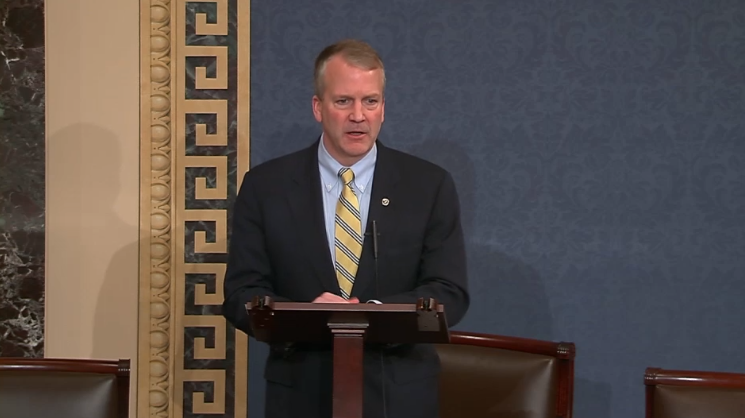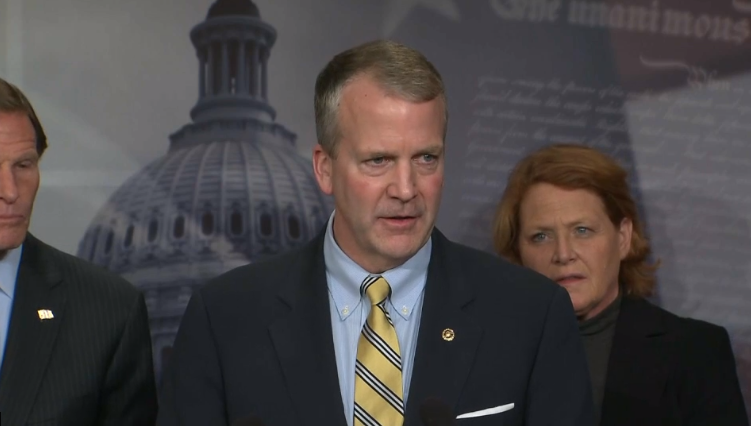Senate Overwhelming Passes Legislation to Combat Online Sex Trafficking
“The fact that this is a problem in America, I think shocks a lot of people.”
WASHINGTON, DC – Today, U.S. Senator Dan Sullivan (R-AK) joined 96 of his colleagues to support the Senate passage of H.R. 1865, a grouping of both the Stop Enabling Sex Traffickers Act (SESTA) and the Allow States and Victims to Fight Online Sex Trafficking Act. The legislation – which garnered the support of the White House and passed the U.S. House late last month – takes serious steps to hold websites and other institutions accountable that knowingly facilitate sex trafficking activity by closing loopholes in outdated federal communications law.
Sullivan, an original sponsor of the legislation, spoke passionately alongside a bipartisan group of his colleagues on the Senate floor today to discuss the critical importance of the legislation and the impact it will have on reducing “the horrible scourge of human sex trafficking all across the country.”
Senator Sullivan encourages the passage of bipartisan legislation to combat online sex trafficking (click image or here to watch)
“What we do in this legislation is we’re taking the fight to one of the places in this country where human trafficking and sex trafficking has really exploded – and that’s the Internet,” Senator Sullivan said in his floor speech. “The bipartisan legislation we’re debating right now will ensure that websites and other institutions on the Internet, and the companies related to them, that knowingly – and that’s an important word – facilitate sex trafficking can be held accountable for their actions. It will also create new federal crimes related to promoting or facilitating human trafficking over the Internet and give more resources to state prosecutors to go after these heinous crimes.”
Following the passage of H.R. 1865, Senator Sullivan emphasized the need for the legislation in a press conference with bill advocates and fellow Senate Commerce Committee members.
Sullivan speaking on the importance of SESTA-passage during a bipartisan press conference (click image or here to watch).
“The fact that this is a problem in America, I think shocks a lot of people. The fact that it’s not just a problem in America, but it’s increasing – you know the numbers that you’ve heard about increases of online trafficking going up by some estimates over 800%, it’s unbelievable. It’s a huge problem in my state of Alaska…,” Senator Sullivan said during the press conference. “ But one aspect of this bill – it was the same aspect that we had in the 2015 Victims for Human Trafficking bill – is that we’re starting to unleash … the power of state AGs. One of the big problems with human trafficking cases is we don’t have enough resources. We don’t have enough money, investigators, or prosecutors. What this bill does – what the bill in 2015 did – it says ‘alright, federal law is the standard but we’re going to allow Attorneys General, District Attorneys, frontline prosecutors to go after these individuals.’ This bill does that…because finally we’re going to start bringing the resources to bear on these heinous crimes that unfortunately are growing in our country.”
H.R. 1865 makes narrowly crafted changes designed to make websites that knowingly engage in sex trafficking civilly liable, allows state attorneys general to prosecute websites that violate federal sex trafficking laws, and gives victims the opportunity to seek the justice they deserve. The bill also strengthens criminal penalties for websites that facilitate illegal prostitution or sex trafficking.
The legislation is the result of a two-year Permanent Subcommittee on Investigations (PSI) inquiry which resulted in a report entitled “Backpage.com’s Knowing Facilitation of Online Sex Trafficking,” which found that Backpage.com knowingly facilitated criminal sex trafficking of vulnerable women and young girls and then covered up evidence of these crimes in order to increase its own profits. The bill is supported by trafficking survivors, anti-human trafficking advocates and law enforcement, 50 Attorneys General, the civil rights community, faith-based groups, the larger tech community, and courts and judges who have made clear that it is Congress’ responsibility to act to protect sex trafficking victims.
###
Next Article Previous Article


